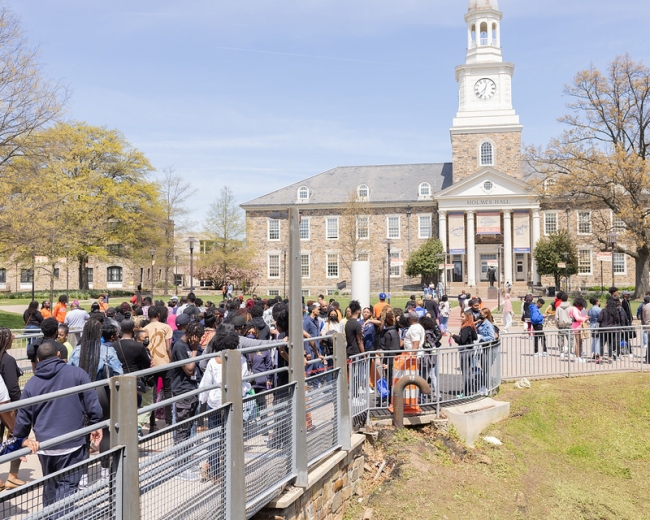You have /5 articles left.
Sign up for a free account or log in.

Prospective students visit Morgan State University’s Baltimore campus.
Morgan State University/Flickr
Although Towson University withdrew its proposal for a new business analytics doctoral program last week amid complaints by Morgan State University that the program duplicated one of its programs, Towson officials have indicated that they plan to resubmit the proposal.
The withdrawal also occurred after the state attorney general’s office raised concerns about the legality of the approval of the proposed program by the Maryland Higher Education Commission. Towson officials said the withdrawal was prompted by a July memo from the higher education commission calling on higher ed institutions to voluntarily pause seeking permission to create programs that are contested by other public colleges or universities in the state. The memo recommended the pause because a Maryland General Assembly work group is in the process of taking a closer look at how the commission reviews academic programs. The group plans to issue recommendations to the commission in December, which could result in changes to commission processes.
Legal concerns expressed a month later by the state attorney general’s office about the Maryland Higher Education Commission’s approval of the plan further complicated the matter.
“TU fully intends to resubmit the program proposal at a later date, once there is greater clarity regarding the academic program review process, as we strongly believe that our program is not duplicative of MSU’s Business Administration Ph.D., and that offering the Business Analytics Ph.D. will benefit students and Maryland as a whole,” Sean Welsh, vice president for university marketing and communications at Towson, wrote in an email Friday.
Towson’s withdrawal came after considerable back-and-forth regarding whether its proposed program would be too similar to a business administration doctoral program at Morgan State, a historically Black university in Baltimore. Morgan State leaders and HBCU advocates spoke out against the program’s approval and view the issue as the latest episode in a long history of predominantly white institutions duplicating programs at their institutions.
“Morgan’s program is high-quality, high-productivity and increasingly highly diverse,” said M. C. Brown, executive director and research scientist at the N. Joyce Payne Center for Social Justice, a think tank and research center at the Thurgood Marshall College Fund, which represents public HBCUs. “Towson saw an opportunity to pilfer those students that are going to Morgan because of the quality of the program … It’s disappointing, but I’m glad they finally pulled back.”
Towson leaders insist the program isn’t duplicative.
A Fraught Review Process
The saga over the Towson proposal has had multiple twists and turns over the last five months. Emily A. A. Dow, the commission’s assistant secretary for academic affairs, initially rejected it in April because she deemed it “unreasonably duplicative” of Morgan State’s program, according to a letter sent to Towson University leaders. But the commission reversed that decision at a meeting in June, after Towson administrators requested they reconsider, and approved the program “effective immediately” because of “distinct differences in their curricula,” according to a letter from the commission to Towson leaders.
Morgan State leaders were dismayed by the move.
“Needless to say, I was utterly shocked by this decision since any objective reviewer of the Towson proposal, compared with Morgan’s highly successful PhD program, would have immediately concluded that it was duplicative,” Morgan State president David K. Wilson wrote in a letter to State Senator Brian J. Feldman, chair of the Education, Energy and the Environment Committee, and State Delegate Vanessa E. Atterbeary, chair of the Ways and Means Committee.
Morgan State is working toward attaining R-1 status, the coveted Carnegie Foundation classification reserved for universities with doctoral programs and that show a certain level of research prowess, Wilson told them. Towson University leaders outlined in a recent public strategic plan their goal to reach R-2 status, the classification Morgan State currently has.
“They seem hellbent on trying to achieve that classification by duplicating many of Morgan’s existing high-quality programs,” Wilson wrote in the letter to state lawmakers.
Wilson added in that letter, and in another letter to Maryland Higher Education Commission chair Catherine J. Motz, that there were also possible legal problems with the program’s approval process. Namely, only seven out of 12 commissioners were present when they decided to approve the program, and the vote was 4 to 3, so the approval wasn’t supported by the majority of the commission.
Motz, who took office after the controversial vote this summer, requested guidance from the Maryland Office of the Attorney General on whether the vote followed proper procedure. Patrick B. Hughes, chief counsel of opinions and advice for the attorney general’s office, responded in a letter to the commission in August that the vote was likely legally invalid.
“My view is that the Commission is likely required, by its own regulations, to meet again to attempt to render a decision with the necessary number of votes on Towson’s request for review,” Hughes wrote.
Wilson said in a statement that he was “pleased” with the determination made by the attorney general’s office.
“We look forward to moving beyond this episode and continuing to focus our attention on the more than 140 academic degree programs at Morgan, many of them offered exclusively at our University,” he said.
Welsh, the Towson spokesman, said an “administrative error” by the commission does not indicate that the proposed program is “in any way duplicative of any other program, nor does it have any impact upon the merits for the program’s approval.” He noted that the program would only enroll six students annually.
Rhonda Wardlaw, director of communications for the commission, wrote in an email that if Towson were to try again, the commission “would treat the resubmitted proposal as a new proposal.”
A Long History
This incident isn’t the first time duplicated programs between predominantly white institutions and HBCUs have been a source of conflict in Maryland.
Representatives of Maryland’s HBCUs—Morgan State, Coppin State University, Bowie State University and the University of Maryland Eastern Shore—sued the state in 2006 for allowing predominantly white institutions to duplicate their programs and for underfunding them. That lawsuit took 15 years to resolve and resulted in the state agreeing to allocate $577 million in additional funding to the state’s HBCUs over 10 years.
Felecia Commodore, associate professor of higher education at Old Dominion University, said the lawsuit partly explains why the controversy surrounding Towson’s proposed program has been so contentious.
“To already have a judgment that says, yes, this was one of the practices that was engaged in and perpetuated systemic racism against these institutions and ultimately impacted the finances they should have received compounded over decades, to then turn around and do the thing we already said is bad practice, is concerning,” she said. “It’s a little alarming.”
She noted that most states with state governing boards or coordinating boards overseeing public higher education have processes in place to review new academic programs to avoid duplication, but these processes need to be evaluated to make sure duplications don’t slip through the cracks.
Harry Williams, president and CEO of the Thurgood Marshall College Fund, said the worry among HBCU leaders is new, duplicative programs at neighboring universities siphon away enrollments and state funding from HBCUs’ existing programs, when these institutions are already chronically underfunded.
He noted that if HBCUs are unnecessarily competing for scant state resources, that can also affect their Carnegie Classification status at a time when many HBCUs are eager to prove their research clout. For example, universities are required to graduate a certain number of doctoral students to achieve R-1 status, but an HBCU might not have enough state funding to support so many students in a particular program if it is competing for funding.
Brown said program duplication has been a historic problem in Southern states in general, particularly in Mississippi, Alabama, Louisiana and Maryland, so much so that a 1992 U.S. Supreme Court ruling, United States v. Fordice, determined that the Mississippi public higher education system hadn’t properly desegregated in part because of rampant duplicated programs.
He added that predominantly white institutions duplicating HBCU programs evokes disturbing “prior racial histories,” whether or not that’s the intention.
If two programs are of equal quality and produce the same workforce outcomes, “what would make someone choose the new program if all things are equal?” he said. “The only factor that cannot be accounted for—in cost, merit, legacy and production—would be old racial tropes, that one institution is, quote-unquote, better than another institution based on its historic student composition. And those are not values that we want to promote in this country.”
Brown emphasized that the tensions over Towson’s proposal are about more than one doctoral program in business. He sees the episode as an “opportunity” for university system leaders across the country to think about how to avoid duplicating programs and spreading state resources too thin, which he believes hurt not only HBCUs but the states in which they reside.
“While I respect Morgan’s outcry on the issue, the people who really should have cried out are the taxpayers of Maryland,” he said. “The fact that one institution, doesn’t matter the reason, wants to seek to waste taxpayer dollars by duplicating a function that’s already being delivered, that’s bad business.”





